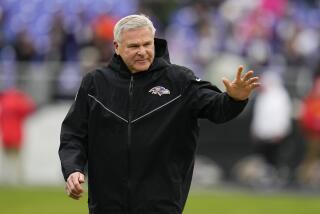Race Issue Still Topic of Concern for Shell
- Share via
MIAMI — Art Shell hoped that when he became head coach of the Raiders in 1989, the first African American to be given such a position, racism had been removed from the league’s hiring practices.
But here he is 10 years later, again trying to get a head coaching job, wondering if his failure to do so can be traced to his race.
“I hope that we are beyond that,” said Shell, offensive line coach of the Atlanta Falcons, who will face the Denver Broncos in today’s Super Bowl. “I felt that we got beyond that in L.A.
“When people say they can coach [referring to African Americans], I hate to hear ‘they,’ because that means, oh, there’s another group over there that is separate. We can work. You tell me why there haven’t been enough hires [of blacks]. I am disappointed with all the opportunities that have come about this year that there haven’t been more hires. It’s kind of strange.”
There have been nine head-coaching openings in the NFL since the end of the regular season. Only one has gone to a black candidate, Ray Rhodes, who was fired from the Philadelphia Eagles and hired by the Green Bay Packers. Since 1996, Rhodes is the only African American picked for 31 openings in a league where more than three-quarters of the players are black.
Rhodes will be one of three African American head coaches--Dennis Green of the Minnesota Vikings and Tony Dungy of the Tampa Bay Buccaneers are the other two--in the 31-team league in 1999.
“I think it is a question of changing the hiring process,” Commissioner Paul Tagliabue said, “and trying to ensure that what you have . . . is a hiring process and a way of evaluating your talent pool which is even-handed and which creates opportunities. You need affirmative action to create opportunities. You don’t need affirmative action that builds in artificial preferences.
“I think we have made a lot of progress on that in the past couple of years. Am I satisfied with where we are? No. And I don’t think anybody in the league is. Do we think we are making real progress? Yes.”
Progress, said Tagliabue, begins in the ranks of the assistants.
“A number of things we have done in the past several years, I think, is beginning to increase the number of coordinators, African American coordinators,” he said. “It is beginning to create a deep and diverse pool of talent that knows it can be upwardly mobile and it will get a shot at head coaching positions and, over time, I think we will get there.”
Whether Shell ever gets there is another matter.
He has had two interviews for head-coaching jobs, one with the Raiders before they hired Jon Gruden last season, and one this year with the new Cleveland Browns, who hired the Jacksonville Jaguars’ offensive coordinator, Chris Palmer.
“I’ve always felt that I would get another opportunity,” Shell said. “It hasn’t happened that way yet. I’m a very positive person, and I believe good things will happen if you’re patient.
“The correct thing for me to do is to try to help somebody win. When I went to Kansas City, I wanted to make Marty Schottenheimer the best coach in the league. And when I came here, I wanted to try to make Dan Reeves the best coach in the league.”
At first glance, Shell would appear to have the credentials to get another chance to run a team. In five-plus seasons with the Raiders, he was 54-38 and led them to the AFC championship game in 1990 before losing to the Buffalo Bills, 51-3.
“I knew I had to be successful to give others a chance,” Shell said.
After his early success with the Raiders, Shell was let go when they struggled in his final few years with the team. “I still feel some bitterness about that,” he said. “I feel I should not have been fired, but I knew we needed to make some changes in the staff.”
The dominating presence of owner Al Davis made it difficult to determine where Davis’ authority left off and Shell’s began.
“When I started as a head coach, I told him [Davis] that I will need your help,” Shell conceded. “But soon, I started to grow.”
There were some moments that stunted that growth. Shell was once accused of derisively referring to quarterback Jeff Hostetler as a “white quarterback” during a fierce confrontation between the two on the sidelines that was seen by a national television audience.
And when running back Marcus Allen blasted Davis on a Monday night telecast, Shell, forced to choose between his job and Allen, a close friend, sided with Davis. That cost Shell the respect of many of his players who were clearly on Allen’s side.
Losing control on the sidelines and losing control of his players are factors that weigh more heavily in the minds of owners than do long resumes.
Considering the disparity between the number of African Americans playing and coaching in the NFL, racism can’t be entirely dismissed as a factor in the selection of a head coach. But in Shell’s case, questions about his ability to lead also cannot be discounted.
More to Read
Go beyond the scoreboard
Get the latest on L.A.'s teams in the daily Sports Report newsletter.
You may occasionally receive promotional content from the Los Angeles Times.










